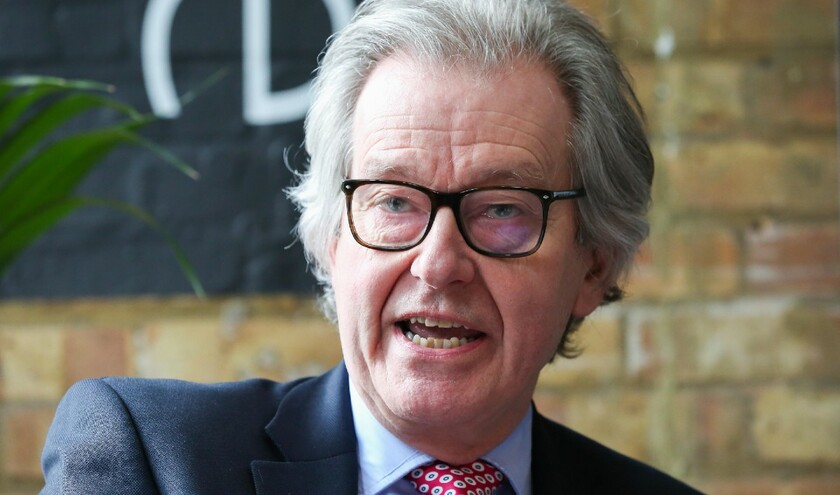Since coming to power Labour has lacerated the Conservatives for their record on the NHS during their 14 years in power.
Dorrell, who was health secretary from 1995 to 1997 and who is now a member of the Liberal Democrats, said: ‘I was myself critical of the stewardship of the NHS when I was a Tory MP and chair of the Health Select Committee, so I agree with most of the substance of the criticism.
‘I don't agree particularly with the tone, however, and you've always got to separate out the substance from the party-political polemics.'
Dorrell said he did not believe there were ‘profound differences' between what the Conservatives, Labour or the Lib Dems were trying to do with the NHS, adding differences were more about the ‘detail of delivery' than principles.
A lot of Labour's fire on the Tories' record has been directed specifically at the Lansley reforms of 2012 that resulted in the creation of NHSE, which Labour has now moved to abolish.
Dorrell agreed the Lansley reforms were ‘ill conceived', arguing that social care had also been neglected.
He said all Governments had failed by measuring the delivery of the NHS in terms of pounds spent.
Dorrell said the key mission of the NHS as a public service was ‘using public money in a targeted way to deliver the best health gain from the resources available'.
Targets, targets, targets
On waiting time targets, Dorrell said he had no issue with bringing waits down for elective care and A&E but added: ‘What is wrong is to imagine that you can pick one element of a joined-up service and define a target and not worry about the impact that has on the combined service.'
He said targets needed to be part of a ‘coherent narrative' and there was a danger of too much focus on the access targets rather than outcome.
Dorrell conceded it was more difficult to quantify healthcare outcomes, however, adding: ‘The fact that it's more difficult doesn't mean you should just forget about it.'
Looking at Wes Streeting's broad drive to boost productivity, Dorrell said he supported the idea of league tables as long they compared ‘like with like'.
‘What I think is right is to encourage people to see how they're doing on a wide range of different parameters compared with people who are broadly similar,' Dorrell said.
The former health secretary said the NHS must address the ‘dirty secret' that it fails to provide equal access to healthcare.
NHS abolition
Dorrell said he was ‘very cynical' about the Government's announcement on NHSE abolition, arguing the PM had been ‘looking around for a big headline' on increasing efficiency.
‘I suspect this policy was decided over a maximum period of a fortnight,' he added.
‘And what the Government has done is said they're going to abolish NHSE. What they haven't done is said what they're going to put in its place.
‘It's no more a policy than 40 new hospitals was a policy. It's exactly the same kind of policy. It's a press release.
‘They have told us precisely nothing about how they are going to manage the NHS.'
Dorrell said the Government had flouted good business sense in managing a big organisation in the right order of: strategy, structure and then people.
‘What they've done is exactly the wrong way around,' he said. ‘They've got rid of the people, then they've abolished the structure and now they're still worrying about the strategy.'
The former health secretary said the theory that NHSE abolition was in order to create direct accountability with the PM and health secretary was nonsense, arguing the buck had always stopped with the Government whether there was an arms-length management body or not.
In addition, he argued cutting ICB costs by 50% amounted to asking half of the people to do the same job as all the people, ‘it's obviously nonsense', he said.
Dorrell accused the Government of making exactly the same mistake as Andrew Lansley by saying ‘no more top-down reorganisation' and then doing exactly that.
The former health secretary added there was a policy vacuum in terms of setting out how the Government intended to achieve its three shifts.
Social care
Social care has been very much the ‘elephant in the room' in terms of the Government's efforts to develop a more integrated care system.
Critics have been scathing of the increase in National Insurance Contributions for care providers and the announcement of a commission on social care which will not conclude until 2028. Dorrell said he had no confidence that social care would be significantly better off as a result of the 10-Year Health Plan, given the Government's record to date.
What's the plan?
Concluding, Dorrell said Labour had a huge opportunity to introduce changes to the health service but was in danger of botching the job.
‘The bar to being a good Labour Government for health is higher because the expectations are higher,' he warned.
Counting himself a ‘critical friend' of the Government, Dorrell said: ‘It's disappointing that we're into month nine roughly of a Labour Government and frankly they've spent more money, they've committed more money and that's helped settle some disputes that had been allowed to fester by the previous Government but we've got almost no idea about how they think the health service needs to change.'
Asked by HM if the problem was the Government didn't really know what the future plan should be, Dorrell replied: ‘Well either they don't know or they've kept it a state secret.'
Maybe the big policy reveal will come with the 10-Year Health Plan. We can only hope.
If you would like to appear in The Big Interview email Lee Peart at l.peart@hgluk.com



